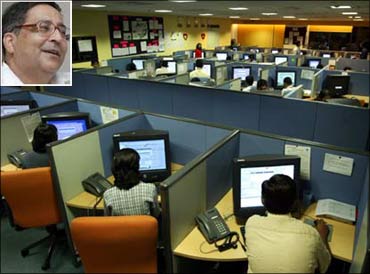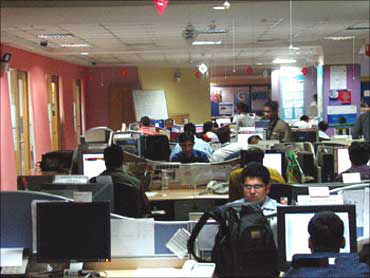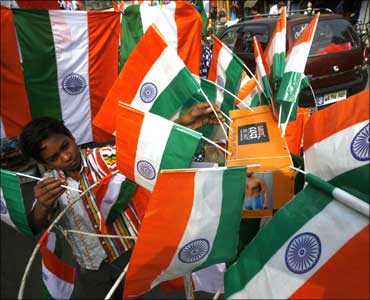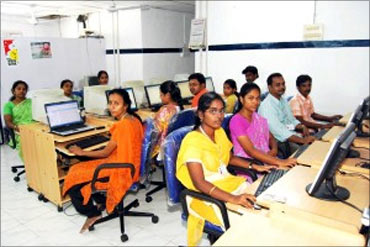 | « Back to article | Print this article |
India's chief statistician speaks on wrong GDP data
With the official statistical system drawing criticism from various quarters, it has been an eventful four months for T C A Anant, the chief statistician of India.
In a conversation with Business Standard, he talks in detail about the areas he has identified to stop the perceived deterioration in official statistics.
In the light of the recent events, with gross domestic product and index of industrial production figures facing heavy criticism from experts and even the Reserve Bank of India, have you identified the areas of weakness?
Yes, there are things which have come to my attention. Let me take the GDP exercise.
The error in the first quarter national account numbers happened as some of the deflators used in the construction of GDP were incorrect.
The source of the mistake is not clear, but it is possible, as a fair amount of manual transcription takes place.
The source of the error is not as important as the fact that computation error detection exercises, which is standard in all large statistical exercises, did not pick up the original error.
This happened because a set of checks were applied to the numbers, but those checks were not adequate.
Click NEXT to read further . . .
India's chief statistician speaks on wrong GDP data
What are the measures you have taken to prevent such incidents in future?
One exercise we have done is to put in place a mechanism to document and strengthen the error correction checks which will be performed in the GDP computation.
We are also putting in place a mechanism to better document the process in which the quarterly GDP data are computed.
Once that documentation is complete, it will be reviewed by the advisory committee on national accounts. Based on the review of the advisory committee, the process can be improved.
What the particular incident of the GDP figures has brought out to me is that there are weaknesses in some of the documentation which relate to processes being followed in generation of different estimates.
A process of review is underway on how we can strengthen this.
Click NEXT to read further. . .
India's chief statistician speaks on wrong GDP data
What are the measures you have taken to prevent such incidents in future?
One exercise we have done is to put in place a mechanism to document and strengthen the error correction checks which will be performed in the GDP computation.
We are also putting in place a mechanism to better document the process in which the quarterly GDP data are computed.
Once that documentation is complete, it will be reviewed by the advisory committee on national accounts. Based on the review of the advisory committee, the process can be improved.
What the particular incident of the GDP figures has brought out to me is that there are weaknesses in some of the documentation which relate to processes being followed in generation of different estimates.
A process of review is underway on how we can strengthen this.
Click NEXT to read further. . .
India's chief statistician speaks on wrong GDP data
Apart from the GDP, the IIP figures have also faced heavy criticism for being 'volatile' and 'irregular'.
Yes, so independently another exercise is being done, which will entail a similar documentation and review of the processes that go into the construction of IIP data.
This IIP audit has been ordered by the National Statistical Commission and will be implemented by the Ministry of Statistics and Programme Implementation.
We have also identified a second gap, which I have partly discovered and partly gathered from talking to people.
This is the nature of coordination which takes place between this ministry and the nature of work that takes place in other ministries, and state governments.
We are taking some steps in order to strengthen this process.
This involves improving dialogue between statistical advisors and officers in other line ministries to understand the constraints and issues they face and see if we can help and improve them. We are also going to initiate a dialogue with state governments.
We are trying to strengthen our mechanism for inter-state coordination.
Click NEXT to read further. . .
India's chief statistician speaks on wrong GDP data
It has often been said that the official statistical system is suffering from a human resource constraint. Are you exploring ways to outsource data collection?
Outsourcing is always problematic. Even with the Post Office thing we are doing it, and I do not know how successful it will eventually turn out to be.
This is because the core competency of that organisation and the people is not statistics, nor is their principal focus data gathering.
It takes some effort to ensure that people who are not trained data gatherers do efficient data investigation.
We have experimented with different forms of outsourcing. This was one, then in some exercises they are working in partnership with some NGOs in women and child health, and education.
So, we are looking at the possibility of innovative solutions.
In some cases, it might be possible where there is no existing machinery but where it is there gaps cannot be filled in just by these kinds of solutions.
The new solutions need to dovetail the existing ones. We are looking there to see how we can use technology and some amount of outsourcing to help matters.
Click NEXT to read further. . .
India's chief statistician speaks on wrong GDP data
There were talks about MoSPI using corporate affairs ministry's data and that you are also planning to talk to the Income Tax Department for data for national accounts? What is the progress?
The manner in which company affairs gather data, it is not readily transferable to the format we use. The database system has to permit these kinds of queries and extractions. This is not always the case.
We are planning to get into dialogue with tax people. They gather a lot of data and this would help us. But again, the challenges are there.
They are ongoing exchanges.
Each ministry has incorporated technology in its own way and they are evolving in their own way.






